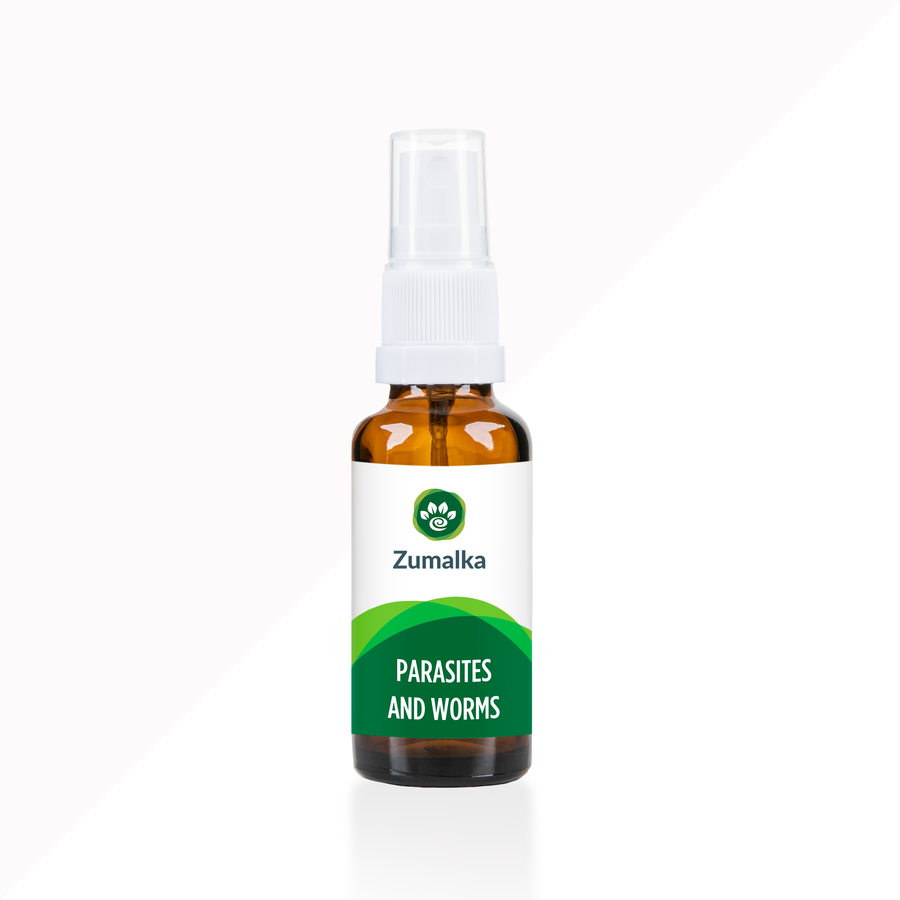How to Get Rid of Worms in Cats Naturally: Vet-Approved Holistic Remedies
List of Contents
Believe it or not, your cat could have intestinal worms right now—without showing a single symptom. Shockingly, studies reveal that up to 45% of cats in the United States are infected. Could yours be one of them?
Even more alarming, while worm infections aren’t immediately deadly, they can cause severe health issues if left untreated. Infected cats risk malnutrition, anemia, and, in extreme cases, a potentially fatal stomach rupture.
Want to keep your cat healthy and worm-free? This guide covers everything you need to know about cat worms—including how to identify, treat, and prevent them.
The 4 Most Common Intestinal Worms in Cats

Interestingly, cats infected with worms are most commonly affected by roundworms, tapeworms, hookworms, or whipworms. In this section, we'll take a closer look at each type.
#1. Roundworms
Roundworms, classified as Toxascaris leonina and Toxocara cati, are deemed as the most common intestinal parasites in cats. They resemble spaghetti and can grow up to 10 cm (4 inches) long. These parasites reside in a cat’s small intestine, feeding on partially digested food.
Roundworms can spread without an intermediate host, but cats are often infected by consuming infected animals or their feces. They can also contract the parasites directly by ingesting contaminated feces from another cat.
Kittens are especially vulnerable, as Toxocara cati larvae can pass through their mother’s milk—a process called trans-mammary infection. Once inside the digestive system, the eggs hatch into larvae, molting several times before becoming adult worms.
While roundworms may appear in cat poop, heavily infected cats might also cough up or vomit worms. This occurs when large infestations cause larvae to migrate to the lungs and other tissues.
#2. Tapeworms
Tapeworms, classified as Dipylidium caninum and Taenia taeniaeformis, require an intermediate host to complete their life cycle. Cats become infected by eating rodents, reptiles, or amphibians carrying tapeworm eggs or adults.
Cats can also contract tapeworms by ingesting infected fleas. Flea larvae consume worm eggs from the environment, allowing the parasite to develop as the flea matures. When a cat grooms and swallows an infected adult flea, the tapeworm is released into its digestive system, where it continues to grow.
As their name suggests, tapeworms resemble long, ribbon-like strips and can grow up to 70 cm (27 inches). Their bodies consist of segments, called proglottids, which are produced by the tapeworm’s neck and contain both male and female reproductive organs.
Tapeworms release mature proglottids filled with parasite eggs into the environment, usually through feces. These segments, resembling grains of rice or sesame seeds, can move independently and may be found in your cat’s feces, on the floor, carpet, fur, or around the anus.
#3. Hookworms
Hookworms (Ancylostoma tubaeforme and Ancylostoma braziliense) have hook-shaped mouthparts that allow them to attach to the intestinal mucosa and feed on blood, making them hematophagous parasites. They are extremely small—about 3 mm (1/8 inch)—and nearly invisible to the naked eye.
In cats, hookworm infections are rarer than in dogs. Infection occurs when a cat ingests feces containing hookworm larvae or immature worms from another cat or dog, or infected cockroaches.
A unique trait of this intestinal worm is its ability to penetrate the skin, particularly through the paw pads, as seen with A. braziliense and A. caninum. The larvae then migrate to the intestine, where they mature and complete their life cycle.
Although human infections are rare, wearing gloves when handling an infected cat or cleaning the litter box, and avoiding walking barefoot, can help reduce the risk. If left untreated, hookworm infections can cause severe anemia, which may be fatal, especially for young kittens.
#4. Whipworms
Whipworms (Trichuris serrata and T. campanula) are named for their whip-like shape, with a long, thin anterior and a short, thickened posterior.
Measuring 30–50 mm (1–2 inches), these intestinal parasites feed on blood, much like their hookworm relatives.
Whipworms don’t require an intermediate host to complete their life cycle. Their eggs are passed through stool, and when a cat eats infected feces, a whipworm infestation is likely. The eggs then reach the intestinal tract, where they mature into adults and begin reproducing.
Whipworm infections often cause mild or no symptoms. However, in severe infestations, significant weight loss and chronic vomiting may occur.
Common Signs and Symptoms of Worms in Cats

As mentioned earlier, worm infestations in cats often have no obvious signs. However, if your pet shows any of the following symptoms, contact your vet immediately:
- Changes in skin and coat health: Intestinal parasites in cats consume blood and vital nutrients, leading to poor skin and coat condition. Infected cats may develop dry, flaky skin and a dull, brittle coat.
- Visible worms on your cat: A common sign of infestation is the presence of worms around your cat’s anus or in its feces. In severe cases, worms in cats may also appear in saliva or other bodily fluids. Tapeworm segments may also be visible in your cat’s stool.
- Changes in bathroom habits: Your cat may visit the litter box more often or struggle to defecate.
- Changes in stomach and gum appearance: Cats with worm infestations may develop a pot-bellied appearance. Additionally, pale gums can indicate blood loss caused by intestinal parasites.
- Increased hunger or thirst: Worms deprive your cat of vital nutrients and blood. For example, a tapeworm infection may increase appetite while causing weight loss. Eating and drinking more is your cat’s way of compensating for these deficiencies.
- Changes in activity levels: Kittens and adult cats with intestinal parasites may become lethargic and lose interest in play or other daily activities.
How Do Vets Diagnose Worms in Cats?
Diagnosing intestinal parasites involves a veterinarian or reference laboratory analyzing a stool sample. This is done through a coproparasitological or fecal exam using the flotation method, which detects parasite eggs.
Because the eggs are lightweight, they rise to the surface, allowing a veterinarian or lab technician to collect them on a slide and examine them under a microscope to identify the worm type. Cats can also be infected with multiple worm species and other parasites at the same time.
How are Infected Cats Treated for Worms?
All worms in cats can be treated with deworming medication, available in oral (tablet, gel, or paste), topical, or injectable forms.
In most cases, multiple treatments are necessary to fully eliminate the worms, as some have complex life cycles, with larvae migrating through muscles or organs before maturing in the intestines.
Because deworming medications primarily target worms in the digestive tract, multiple doses may be required 10–14 days after the first to ensure complete eradication. However, some worm species can be treated with a single dose.
Can You Treat Worms in Cats Naturally?

While no home remedy can fully replace conventional worm treatments, natural support options can help strengthen your cat’s resilience against parasites. These include:
- Coconut oil: It contains lauric acid, which has anti-parasitic and antimicrobial properties. Mix it with your cat’s regular food to prevent diarrhea, and always use food-grade coconut oil. While coconut oil and lauric acid may support digestive health, they are not reliable standalone dewormers.
- Apple cider vinegar (ACV): Research shows that apple cider vinegar (ACV) has some anthelmintic effects against gastrointestinal parasites but is less effective than conventional dewormers. If you choose to give your cat ACV, mix a teaspoon with their food or water.
- Pumpkin seeds: Studies show that pumpkin seeds are rich in cucurbitacin, a compound that can paralyze intestinal worms, making them easier to expel from the body. You can give them to your cat plain, either baked or toasted, ground up or whole.
- Zumalka's PARASITES AND WORMS: PARASITES AND WORMS contains fern (Filix mas), cat thyme (Teucrium marum), and other natural ingredients that support your pet’s immune system, promote digestive health, and help prevent intestinal parasites.
How Do You Prevent Worms in Cats?
Prevention is always better than cure. Reduce your cat’s risk of intestinal worms with these preventive measures:
- Regular deworming: Even if your cat shows no signs of illness, regular deworming is essential based on their age and lifestyle.
- Limit outdoor access: Reducing outdoor exposure minimizes contact with fleas, ticks, other animals, insects, and feces that may carry parasites.
- Maintain good hygiene: Clean the litter box daily and wash your hands immediately after. A contaminated environment increases the risk of intestinal parasites, so maintaining hygiene is essential for your cat’s health.
- Inspect your cat regularly: Check their skin and fur for fleas or ticks and watch for signs of intestinal parasites. If you notice any changes, visit your veterinarian.
FAQs
How can you tell if a cat has worms?
Signs of worms in cats include weight loss, bloating, vomiting, diarrhea, coughing, or visible worms in feces. A veterinarian can confirm the diagnosis through an exam and fecal testing.
How do I get rid of worms in cats?
To eliminate worms in cats, use vet-prescribed deworming medication, which may require multiple doses. Maintain good hygiene, schedule regular vet checkups, and practice preventive care to reduce the risk of re-infestation.
Can I touch my cat if it has worms?
Yes, but wash your hands afterward to prevent transmission. Some worms can spread to humans and other pets. Regular deworming, good hygiene, and keeping your cat’s environment clean help minimize risks.
How to deworm a cat at home?
Administer vet-approved deworming medication as directed, mixing it with food if needed. Maintain hygiene, clean the litter box regularly, and schedule vet checkups. A pet homeopathy expert may also provide additional guidance.
Can I treat my cat for worms without going to the vet?
Over-the-counter dewormers are available, but a vet ensures accurate diagnosis and treatment. Incorrect medication may be ineffective. For your cat’s safety, consult a vet before attempting deworming at home.







Do worms die after your cat ejects them?
I have a older cat very sick. I have dewormer from the vet it’s a year old will it still do the job
Leave a comment